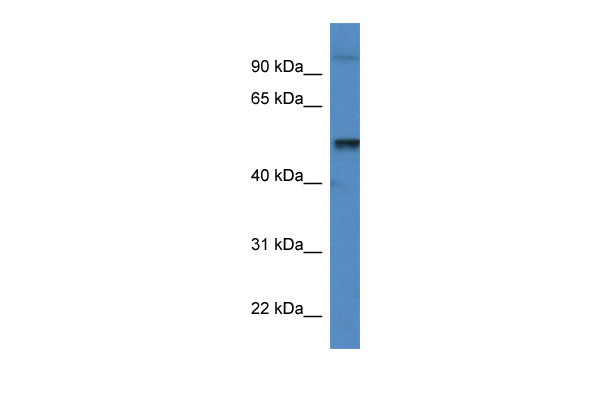Katna1 antibody - C-terminal region
Rabbit Polyclonal Antibody
- SPECIFICATION
- CITATIONS
- PROTOCOLS
- BACKGROUND

Application
| WB |
|---|---|
| Primary Accession | Q9WV86 |
| Other Accession | NM_011835, NP_035965 |
| Reactivity | Human, Mouse, Rat, Rabbit, Pig, Horse, Bovine, Guinea Pig, Dog |
| Predicted | Human, Mouse, Rabbit, Pig, Horse, Bovine, Dog |
| Host | Rabbit |
| Clonality | Polyclonal |
| Calculated MW | 54kDa |
| Other Names | Katanin p60 ATPase-containing subunit A1 {ECO:0000255|HAMAP-Rule:MF_03023}, Katanin p60 subunit A1 {ECO:0000255|HAMAP-Rule:MF_03023}, 3.6.4.3 {ECO:0000255|HAMAP-Rule:MF_03023}, Lipotransin, p60 katanin {ECO:0000255|HAMAP-Rule:MF_03023}, Katna1 |
|---|---|
| Format | Liquid. Purified antibody supplied in 1x PBS buffer with 0.09% (w/v) sodium azide and 2% sucrose. |
| Reconstitution & Storage | Add 50 ul of distilled water. Final anti-Katna1 antibody concentration is 1 mg/ml in PBS buffer with 2% sucrose. For longer periods of storage, store at 20°C. Avoid repeat freeze-thaw cycles. |
| Precautions | Katna1 antibody - C-terminal region is for research use only and not for use in diagnostic or therapeutic procedures. |
| Name | Katna1 |
|---|---|
| Function | Catalytic subunit of a complex which severs microtubules in an ATP-dependent manner. Microtubule severing may promote rapid reorganization of cellular microtubule arrays and the release of microtubules from the centrosome following nucleation. Microtubule release from the mitotic spindle poles may allow depolymerization of the microtubule end proximal to the spindle pole, leading to poleward microtubule flux and poleward motion of chromosome. The function in regulating microtubule dynamics at spindle poles seems to depend on the association of the katanin KATNA1:KATNB1 complex with ASPM which recruits it to microtubules. Reversely KATNA1:KATNB1 can enhance ASPM blocking activity on microtubule minus-end growth. Microtubule release within the cell body of neurons may be required for their transport into neuronal processes by microtubule-dependent motor proteins. This transport is required for axonal growth. |
| Cellular Location | Cytoplasm {ECO:0000255|HAMAP-Rule:MF_03023}. Midbody {ECO:0000255|HAMAP-Rule:MF_03023}. Cytoplasm, cytoskeleton, microtubule organizing center, centrosome {ECO:0000255|HAMAP- Rule:MF_03023}. Cytoplasm, cytoskeleton, spindle pole {ECO:0000255|HAMAP-Rule:MF_03023}. Cytoplasm, cytoskeleton, spindle {ECO:0000250|UniProtKB:O75449}. Note=Predominantly cytoplasmic Localized diffusely in the cytoplasm during the interphase. During metaphase is localized throughout the cell and more widely dispersed than the microtubules. In anaphase and telophase is localized at the midbody region. Also localized to the interphase centrosome and the mitotic spindle poles. Enhanced recruitment to the mitotic spindle poles requires microtubules and interaction with KATNB1 (By similarity). Localizes within the cytoplasm, partially overlapping with microtubules, in interphase and to the mitotic spindle and spindle poles during mitosis (By similarity). {ECO:0000250|UniProtKB:O75449, ECO:0000255|HAMAP-Rule:MF_03023} |

Thousands of laboratories across the world have published research that depended on the performance of antibodies from Abcepta to advance their research. Check out links to articles that cite our products in major peer-reviewed journals, organized by research category.
info@abcepta.com, and receive a free "I Love Antibodies" mug.
Provided below are standard protocols that you may find useful for product applications.
References
Syu L.-J.,et al.Mol. Cell 4:109-115(1999).
Karabay A.,et al.J. Neurosci. 24:5778-5788(2004).
If you have used an Abcepta product and would like to share how it has performed, please click on the "Submit Review" button and provide the requested information. Our staff will examine and post your review and contact you if needed.
If you have any additional inquiries please email technical services at tech@abcepta.com.













 Foundational characteristics of cancer include proliferation, angiogenesis, migration, evasion of apoptosis, and cellular immortality. Find key markers for these cellular processes and antibodies to detect them.
Foundational characteristics of cancer include proliferation, angiogenesis, migration, evasion of apoptosis, and cellular immortality. Find key markers for these cellular processes and antibodies to detect them. The SUMOplot™ Analysis Program predicts and scores sumoylation sites in your protein. SUMOylation is a post-translational modification involved in various cellular processes, such as nuclear-cytosolic transport, transcriptional regulation, apoptosis, protein stability, response to stress, and progression through the cell cycle.
The SUMOplot™ Analysis Program predicts and scores sumoylation sites in your protein. SUMOylation is a post-translational modification involved in various cellular processes, such as nuclear-cytosolic transport, transcriptional regulation, apoptosis, protein stability, response to stress, and progression through the cell cycle. The Autophagy Receptor Motif Plotter predicts and scores autophagy receptor binding sites in your protein. Identifying proteins connected to this pathway is critical to understanding the role of autophagy in physiological as well as pathological processes such as development, differentiation, neurodegenerative diseases, stress, infection, and cancer.
The Autophagy Receptor Motif Plotter predicts and scores autophagy receptor binding sites in your protein. Identifying proteins connected to this pathway is critical to understanding the role of autophagy in physiological as well as pathological processes such as development, differentiation, neurodegenerative diseases, stress, infection, and cancer.


